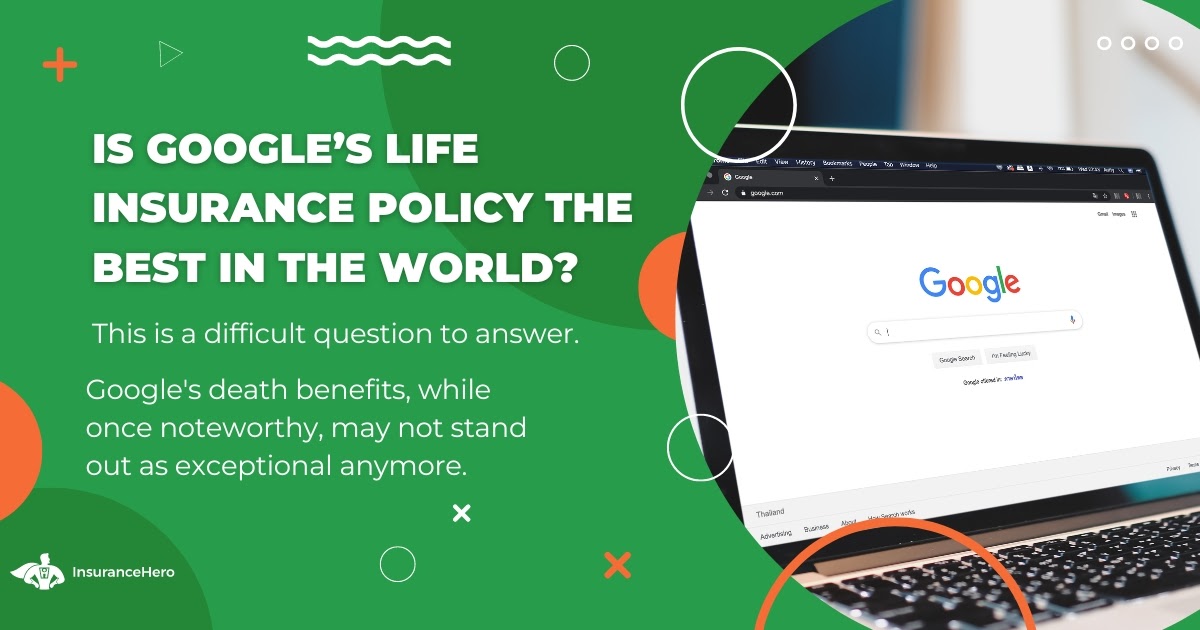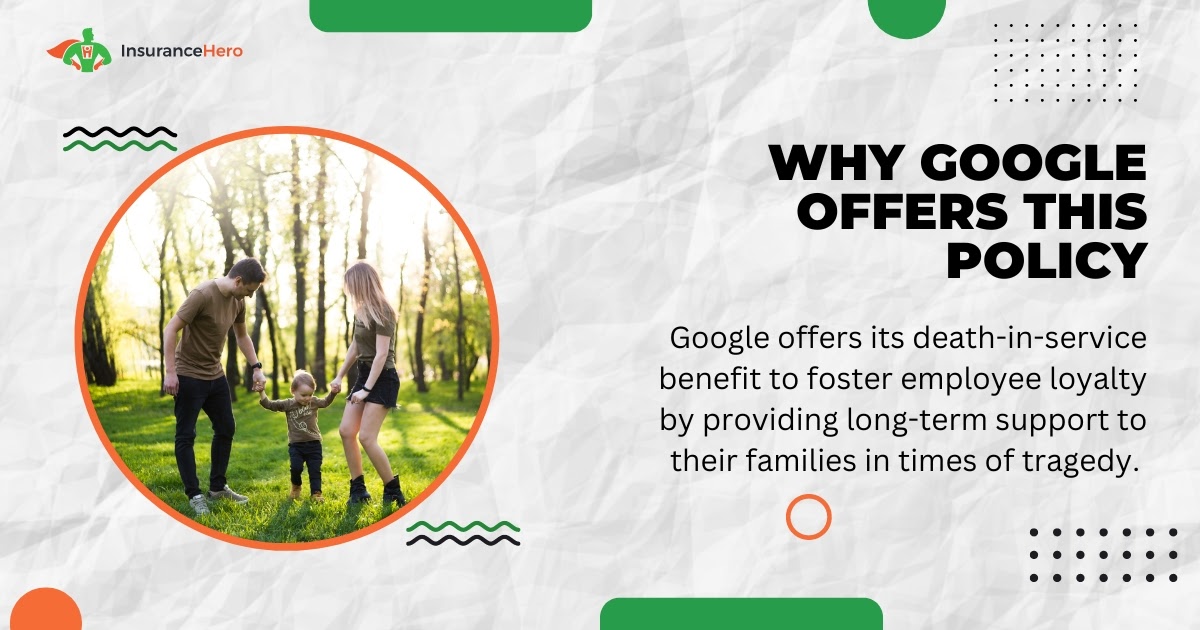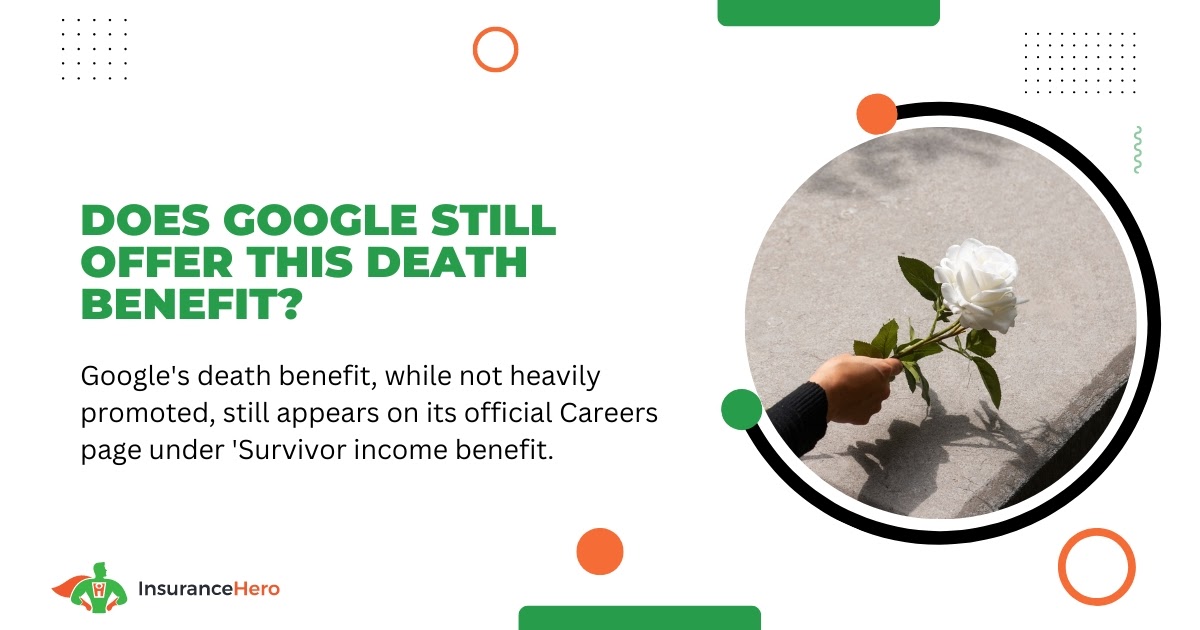Google Life Insurance Benefits: Are They The Best Worldwide?

When it comes to life insurance, there are many different options. For most people today, life insurance cover is unfortunately not one of the benefits provided by your average company, at least not for anyone under the executive level.
While some firms do still offer cover, it’s an exception, not a rule.
Of those companies that do still offer life insurance cover, it can range from almost nothing to some of the best cover you can get. Google, the global Search and Advertising giant, is known for having both a non-standard death benefit for their employees, and for the exceptional quality of that benefit.
The question is, are Google Life Insurance benefits the best in the world, or is that all hype?
What is Google’s Life Insurance Policy?
Many years ago, Google made headlines for announcing a particular benefit for all of their employees. Here’s what they promoted.
If a Google employee passes away, and that employee has a spouse, their spouse will receive 50% of the employee’s salary as a benefit each month for ten years. Additionally, if the employee had any children, each child will receive $1,000 USD per month until they reach the age of 19 – or, if they’re in full-time education like college or university, until they’re 23.
On top of this, any stock options that the employee had would become fully vested immediately.

This benefit applies to any Google employee in the USA, no matter how long they have worked for the company. Even if they’re hired and pass away in a tragic auto accident mere weeks later, that benefit still pays out.
This is known as a death-in-service benefit rather than a more traditional life insurance policy, but it falls in a similar category, given that they’re financial benefits to survivors after an individual’s passing.
To draw up a couple of examples, here are some figures:
- If a Google employee makes £55,000 per year when they pass away, and they have a spouse with no children, that spouse will get 50% of that amount, or £27,500 per year, for ten years, totalling up to be £275,000.
- A Google employee making $55,000 with a spouse and one child who is currently ten years old is a bit more complicated. Their spouse gets the £27,500 per year, but their child also gets the $1,000 per month (which is about £800 as of this writing) until they turn 19. That’s nine years of monthly payments, totalling up to £86,400. Adding that to their parents’ payments, it totals up to £361,400.
These are just a few examples. A Google employee making over £150,000 per year would leave behind quite a sum, and the more children they have, the more that would add up over time.
Why Google Offers This Policy
If you look at it from Google’s perspective, you have to wonder why they offer this form of death-in-service benefit. They lose an employee and pay the equivalent of five years’ worth of salary to the employee’s spouse, which is a significant expense.
Moreover, they’re paying for it rather than a more traditional life insurance policy paid out by a third-party insurance company managing their own funds.
The truth is that Google offers it for one reason: employee loyalty. Employees are encouraged to remain with the company, even in the face of a difficult role or a better offer from another company, because they know that if something awful happens to them, their spouse will be well cared for at least for some time.

Any company fostering loyalty will look for ways to support the survivor of an employee who passes. Sometimes it’s emotional support, sometimes financial support, sometimes social support, but Google decided that it would be official and enduring support, at least for ten years.
To put it in the words of Google themselves, when this was first hitting the news in 2012:
“One of the things we realised recently was that one of the harshest but most reliable facts of life is that at some point most of us will be confronted with the death of our partners, and it’s a horrible, difficult time no matter what, and every time we went through this as a company we tried to find ways to help the surviving spouse of the Googler who’d passed away.”
Google wants talented employees to stay and foster a positive reputation even when something terrible happens to them. For a company worth literal billions, paying out a few hundred thousand in the event of an employee’s death is barely an expense against the bottom line.
Does Google Still Offer This Death Benefit?
All of the information about Google’s death benefits dates back to 2012. Do they still offer them?

It’s somewhat unclear. It’s not something Google feels the need to promote, after all heavily. On Google’s official Careers page, in their list of benefits, “Survivor income benefit” is still listed, so it’s safe to assume something of the sort still functions, though the exact specifics may vary by now.
The Drawbacks to Google’s Life Insurance Policy
There are, unfortunately, two primary drawbacks to Google’s life insurance policy here.
The first is that, given that it’s not life insurance, it’s more restrictive. It pays out to a spouse or a child, but what happens if the Google employee doesn’t have a spouse or a child?
There’s no information about whether those benefits can be paid instead to a surviving parent, a sibling, an unmarried partner, or even a charitable foundation. With traditional life insurance, you can name virtually anyone as a beneficiary, as long as they can sign the paperwork.

The second major drawback, especially for those in the UK, is that the benefit seems explicitly for US-based Google employees.
They announced that, at least, back in 2012. Similar benefits may exist for foreign offices, but it’s also possible that they don’t. We don’t have specific information from the inside on this front, so if you do, feel free to let us know.
There are other potential drawbacks as well. For one thing, as an employee benefit, it stops working if the employee ceases to be employed by Google. Whether they’re laid off, quit, or move on to a better-paying tech job with another of the FAANG and top-level firms, they leave that benefit behind.
That’s not unique to Google’s death benefits, though. Almost any company-offered life insurance will be cancelled after an employee leaves the company.
However, with a standard life insurance policy, when it’s a company-sponsored policy, you often have a grace period. You can roll it over into your policy, paying independently to keep it going. Since Google’s cover isn’t standard life insurance, it can’t be rolled over similarly.
Is Google’s Life Insurance Policy the Best in the World?
This is a difficult question to answer.
For one thing, while Google was up-front about promoting this policy back in 2012, it’s entirely possible that things have changed in the many years since. It’s also likely that they haven’t, but inflation and the value of that payment don’t go as far as they used to.
It’s also true that most other companies don’t advertise it the same way Google did (if they offer any life insurance or death benefit at all). Even back then, Google wasn’t using it as a selling point. It just happened to come up in one significant interview and was circulated widely as a result.
One truth is that 50% salary over ten years is equivalent to 100% salary for five years, and 5x salary in a term life insurance policy is not an uncommon benefit amongst companies worldwide. Google’s framing of it amortized over ten years makes it a longer-term form of support.
However, since it’s not a single lump sum paid out all at once, it can’t be as readily invested to harvest ongoing interest gains or stock market growth. While ongoing, reliable support can be valuable, the flexibility of a lump sum payment can be better in the long term.
The added benefit to children can be powerful. £800 per month is a significant amount of money, and if a child is young enough, it can add up to a serious windfall by the time they reach the age where it stops. On the other hand, if the Google employee’s children are already older than that, they don’t get anything, education or not.
Many of the largest companies tend to have non-standard benefits. Smaller companies may offer a simple term life insurance policy, usually managed by one of the big names in insurance. Still, global brands do more innovative things with their benefits package.
It may or may not work out to be better in the long run, but it’s difficult to compare them accurately with so many obfuscating details in the way.
The truth is, it’s unlikely that Google’s is the best. Taking out a £1,000,000 policy on an otherwise healthy young employee would be relatively inexpensive, and a Google employee would need to make £200,000 per year to equal it. While that’s certainly possible for some of their employees, most don’t reach that level.
Death-in-service benefits similar to Google’s benefits exist throughout the UK as well. The NHS has them, for example, and they’re not uncommon in the private sector.
The truth is, Google’s death benefits alone are not entirely that exceptional; it’s the total of all of Google’s benefits that put them near the top, and even then, it’s often in comparison to other American companies, rather than companies in the UK that have more statutory benefits for workers.

What Are Your Best Options for Life Insurance?
While getting life insurance or death-in-service benefits on par with – or better than – those offered by Google is entirely possible, you have three options.
- The first is to be employed by Google themselves, and even then, possibly only if you’re in the USA, which might not be feasible or even a good idea for many of you reading this.
- The second is to find a domestic company that offers similar benefits. You can only discover that through negotiations with the company you’re looking to work for, though the larger they are, the more likely they’ll have such benefits.
- The third is to purchase your own life insurance instead simply. Many would argue that this is the better option. After all, when you’re in charge of the policy, you get to pick what insurance provider you want to work with, you get to choose what level of cover and what terms you wish to pursue, you can even decide between term, whole, and other kinds of life insurance cover.
To rival something like Google’s policy, for millions of pounds of cover, all you need to do is apply. As long as you’re relatively healthy and young, you should have no trouble finding such cover, and even if you’re older or less healthy, you can still find it.
Perhaps the best way to find such cover is to fill out our quick survey here. You can find it on that page or call us directly, and our agents will be happy to help get you started.
By filling out one form, we can secure you quotes from many of the UK’s best insurance providers, From there, it’s just a matter of comparing the policies and picking the one that suits your needs the best.
You don’t have to work for a high salary from Google to guarantee a future for your loved ones. All you need is good life insurance cover; you’ll leave them secure in their lives after you pass. So why not get started today?
Steve Case is a seasoned professional in the UK financial services and insurance industry, with over twenty years of experience. At Insurance Hero, Steve is known for his ability to simplify complex insurance topics, making them accessible to a broad audience. His focus on clear, practical advice and customer service excellence has established him as a respected leader in the field.


